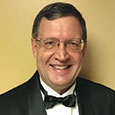 Since this column is an overview of a typical day of teacher in-service, see if your administrator will let reading it replace your actual attendance at the event. I think six hours credit would be fair.
Since this column is an overview of a typical day of teacher in-service, see if your administrator will let reading it replace your actual attendance at the event. I think six hours credit would be fair. It’s the first of three full days of in-service before school begins. Perturbed that I am not rehearsing or at least completing some vital paperwork, I sullenly scribble my name on the sign-in sheet, grab a handout, and look at the seating options in the cafeteria. Since there are only thirty seconds to spare before the excitement begins, not many choice seats are available.
Teachers of like-mind and station have gravitated toward one another. Elementary teachers sporting identical white T-shirts emblazoned with big red apples sit at the front tables. Junior and senior high teachers congregate in the middle. Coaches are ensconced in the seats farthest back, sports pages and playbooks spread out on the tables in front of them.
Not wanting to look too disinterested, I compromise, taking a vacant seat about three fourths of the way back, plopping down beside Coach Kowalski, a retired coach who teaches math part-time. I greet Coach and the other teachers at my table with some perfunctory greetings. We all agree that the summer went by too fast. If past in-service experiences are any indication, these could be the people with whom I will spend some rather intimate moments.
The first day would not be complete without a peppy guest speaker, the kind who actually enjoyed in-service when they were teaching many years ago. This is usually given away by the fact that they speak for three hours without a breath and never give a bathroom break.
The superintendent welcomes everyone back and then introduces the speaker by reading the perfunctory and beef-caked resume: “Dr. Florence Mountebank earned her Bachelor’s degree in Educational Psychology from Pubescent University, a Master’s in Adolescent Angst from Sour Bridge College, and a PhD in Childhood Obesity from the University of Hamburg. She taught for three years in Maryland’s Freefall School District before taking a position as Director of Curriculum and Nutrition for the Jenny Craig School District in Foodstuff, Virginia. During her tenure, the district has been recognized five times by the Dole National Endowment as a Top Banana School. Under her guidance the school has experienced a steady rise of standardized test scores and a steady decline in its Body Mass Index. May I present to you, Dr. Florence Mountebank.”
Bouncing in front of the group to polite applause, she begins. “It’s great to be….wait…is this on?” She gingerly taps the mike as the superintendent runs to her aid, takes the mike, and looks at it curiously. Fortunately, the district tech guru is on hand so he goes to the front and they both examine it.
Eager to move on, Dr. Mountebank begins. “I’ll do without it. I’ve got a big voice. Can you all hear me?”
“No,” a chorus responds from the middle of the auditorium. (The coaches are reading in the back and don’t care one way or the other.) She turns to the tech guy who shows her how to turn the mike on.
“Oh, okay. All right. Here we go. As I was saying. It’s great to be here at Riverside.”
A slight collective grumble comes from the audience and a timid elementary teacher at the front whispers a polite correction.
“Oh, excuse me…Riverview – sorry about that. I’ve been so many places I’ve lost track of where I’m at! Anyway, before we get going I’d like to tell you a little about myself.”
After about a thirty-minute story depicting her rags to riches saga, she interrupts our growing stupor with a sudden, “Everybody get up! Come on now! I said everybody stand up!”
We stand slowly, our own Body Mass Indexes seemingly enlarged during the thirty-minute monologue.
“Now repeat after me! I make a difference!”
“I make a difference.”
“Louder!”
“I make a difference!” We do better with the elementary teachers leading the way.
“I am a teacher and proud of it!” she screams.
“I am a teacher and proud of it,” we repeat.
“I can’t hear you!”
“I am a teacher and proud of it!” we repeat louder.
After about ten more minutes of cheering, she relates a heart-warming story about a first grade teacher who saved twenty-five children from a burning classroom while valiantly managing to teach them their spelling unit as they dropped and rolled to safety. That dramatic moment inspired ten members of the class to become teachers and volunteer fire fighters when they grew up.
Not content with letting the story rest on its own merits, Dr. Mountebank then leads us on to an inevitable and dreaded group activity focusing on teachable moments. First, we pick a leader for our group who will write down our ideas on a giant sticky note and post it on the wall to share with the other groups. Then we are supposed to list unexpected things that might happen in a classroom that would make impromptu, yet effective teachable moments.
After staring at one another for a minute or so, doing our best to avoid eye contact, Coach Kowalski raises his hand to scratch his head. Big mistake. The group quickly thanks him for volunteering, and he good-naturedly accepts his fate. As we concoct our list, Coach slowly writes down our ideas in what must have been just a shadow of how quickly he could scribble football plays on chalkboards many years before at halftime. Yet his efforts are appreciated, particularly when he shares our ideas with the rest of the group. Unfortunately, our once original ideas are presaged by every other group.
After about an hour and a half, we receive a five-minute bathroom break. Upon our return we find problems and puzzles laid out on the tables before us. Having been through many in-services over the years, I recognize them, but still cannot remember how they are solved.
Dr. Mountebank tells us to begin work on the problems and puzzles. I gently paw at my puzzle pieces, looking as casual as I can while thinking pretty hard. Nothing is coming to me. I glance at the other people in my group who are struggling as well. I give up on the puzzle and go to a problem where I must connect all the dots without lifting my pencil. More failure. Eventually Dr. Mountebank works through everything with us, making it look so easy. Then she poses some questions and asks us to share our answers with each other: “How did it make you feel when you could not complete the puzzle or problems? Did you feel stupid? Did your self-esteem suffer? Did you look at someone else’s paper? Did you ask for help? Did you give up? Did you try more than one way to find solutions?” “Do you think our students ever feel this way?” Inspired, Coach Kowalski thoughtfully looks up with tears in his eyes and asks where we are going for lunch.
After lunch we hear more statistics and stories, complete more group work, and close with a grand finale. For this climactic moment, everybody in the room is given a pencil and asked to spread out and form a big circle, our backs pressing against the inner walls of the cafeteria.
“Now what I want everybody to do is take your pencil and balance one side on your index finger while the person next to you balances the other end on their index finger,” Dr. Mountebank begins. “Hold it still. As this recording plays, I want you all to walk toward me as you sing with the song. I know you will recognize it.” She clicks a mouse and the song begins, but cuts out after a second. She tries again and the song Back in Black blasts through before she finally clicks on the correct track, Whitney Houston’s The Greatest Love of All.
Dr. Mountebank motions us toward the center where she is standing, waving her arms like a conductor. (I note that it is not the correct pattern.) I’m sharing my pencil with Coach Kowalski. His hands are rough-looking; I assume from gripping blocking sleds for thirty years.
“These pencils are your students. You must care for them, guide them, love them!” she yells over the music and wailing elementary teachers who are already reduced to tears. Coach and I walk slowly, not wanting to drop our student. We don’t sing. Frankly, we just don’t know each other well enough to be that intimate. Content with our task, we march onward, our arm hairs standing on end in embarrassment as they brush together.
Eventually everyone is in the center of the room, bunched like grapes with pencil-holding hands raised like the claws of a T-Rex. Dr. Mountebank is standing on a chair, admiring her work. “Remember this moment! Remember this moment!” she yells in delight. We will. I think to myself.
As I leave the cafeteria with Whitney Houston’s voice still ringing in my ears, I can’t help but reflect on the day. It wasn’t a total loss. On the good side, I got a story idea out of the deal. On the negative side, I’ll never be able to look Coach Kowalski in the eye again.






